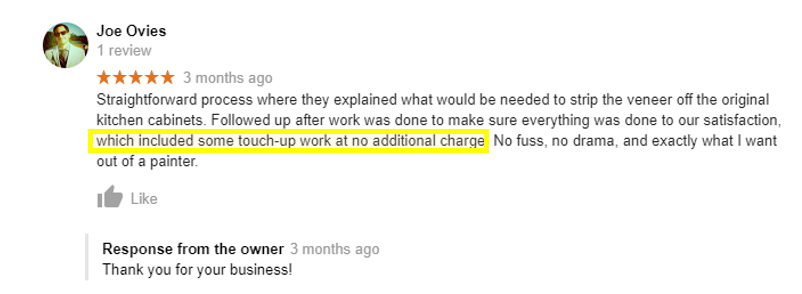Everyone knows that loyal customers recommend companies to friends and co-workers. But what is a loyal customer?
Type “customer loyalty” into Google, and you’ll get ads for companies trying to sell you loyalty programs. Below the ads is a quote from book The Intuitive Customer defining customer loyalty as a “result of a consistently positive emotional experience”.
Of course, loyalty programs are pointless for residential house painters; customers generally have one house, and they get it painted once every few years at the most. But who are loyalty programs designed for, really? When you think about it, does a rewards card make you feel great about a company? Who really has an emotional experience when they scan their grocery store loyalty card and get told they have ten cents off their next fill-up at the gas station?
Customer loyalty isn’t a “yes or no” trait. There are four different levels of loyalty: Best Option Loyalty, Habit-Based Loyalty, Conscious Loyalty, and Identity Loyalty. You aren’t going to get recommendations from customers unless you get them to Level Three. Here’s some information on each of the four levels.
Level 1: Best Option Loyalty
Customers with Best Option loyalty choose a painting contractor because they’re the best option at the time. In most cases, it’s because they know you will paint houses in their neighborhood, and that you did a good job painting their house or their friend’s house. It might also be because they’ve got a coupon or they stored your number in their phone.
This may seem like a weak form of loyalty – and it is. People’s loyalty to most companies they use or visit regularly never gets past this level, however. They’ll keep using the same provider until they get a big discount at a competitor, a strong referral for another painter, or what they feel is a disappointing experience with you. That might take years – or it might happen tomorrow.
Level 2: Habit-Based Loyalty
If a customer uses one business enough times, it will become a habit. The average person makes thousands of decisions per day – several per minute. The only reason they can do this is that most decisions aren’t conscious. They’re based on habit – when you decide to set your alarm clock, you set it for the same time every morning unless you have a good reason to change it. If there’s a track record of something going right, you don’t change it until something goes wrong.
Customers with Habit-Based Loyalty will bring up your company if a friend or co-worker is looking for a painter. They might say you’ve done a good job for them a few times. This is a referral, not a recommendation, but it’s probably enough to get you in the running for a quote.
Customers with Habit-Based Loyalty will probably also call you for future house painting needs. At this point, a 10% off coupon from a competitor or a small issue with a paint job isn’t going make them change painting contractors. It takes too much effort. Do other painting contractors do jobs in this town, or do they do jobs of this size? Will they show up? Does the customer have to provide the paint? Will the work be terrible? There are too many questions to deal with to justify changing painting contractors.
Level 3: Conscious Loyalty
To reach this level, customers have to feel like you’ve done something for them that is beyond what they expected. Unlike Levels 1 and 2, this is an emotional connection – “This painting contractor is great because they’re the only one that does X for their customers” is an emotional statement.
It doesn’t necessarily have to be anything expensive. It could be a simple gesture like offering to paint a small place you’re weren’t paid to paint with the remainder of an unused gallon of paint. A hand-written thank you note is a nice surprise to most customers these days.
Ironically, Conscious Loyalty often results from how you handle a bad customer experience. When customers complain about service quality, they expect some acknowledgement of the response (and some unethical customers take advantage of this fact). But they don’t expect anyone at the company to actually care – most people are too used to calling overseas customer support offices at giant companies to expect that.

As a small business, however, you can offer something those places can’t. If a customer isn’t happy with something and their concern is legitimate, you can admit the error, apologize, and fix it at no cost. At this point, the customer might feel guilty for making a big deal out of the issue and that can lead the customer to want to return your kindness. This can lead to online reviews or in-person recommendations to your painting business.
Level 4: Identity Loyalty
Most people only have a few brands in their lives that form a part of their identity. Coca-Cola or Pepsi? Apple phones or Android phones? Wal-Mart or Amazon? These decisions form major patterns in a person’s life, and changing would take a huge investment of time. These brands also become a part of some people’s identity – many people describe themselves as Coke drinkers, or Amazon users.
Once customers reach this level, it takes a tremendous level of effort to get them to change products. In fact, the only way they’ll change brands is if the product or service really lets them down or does something that makes them very angry. That’s because using a different product requires more than just changing products. It requires changing who they are and how they live. Most brands have to invest a tremendous amount of money to earn customers with Identity Loyalty, and most small businesses don’t have any customers who reach this level.
To learn how ProPainter Websites can help bring you new house painting customers, call us at 919-424-6121 or email us at Team_PPW@ProPainterWebsites.com.
